Displaying items by tag: Samuel Beckett SwingBridge
Dundalk Dredger Docked in Dublin Port Is Up for Sale
The Dublin Port Company has sought expressions from interested parties in undertaking the remaining activities of the port on an exclusive basis.
The Dundalk registered dredger arrived to the capital port on 14 July where she remains berthed at the Bulk Jetty in Alexandra Basin. Her previous owners, the Dundalk Port Company were unique in that they were the only port company to own and operate a dredger in the Republic. For many years the 757-tonnes dredger has carried out numerous contract assignments in ports throughout the island of Ireland including work on the Samuel Beckett swing-bridge and the most project was at Queens Quay, Belfast on the Lagan close to the city-centre.
Hebble Sand was launched by Richard (Shipbuilders) of Lowestoft for British Dredging and later used by Associated British Ports to serve a network of UK ports. Despite her age, the near fifty-year-old veteran vessel has been kept in excellent condition and this was evident during a rather unusual appearance for a ship of her type when attending the Dublin Docklands Maritime Festival in 2009.
She was made open for the public amongst the tall-ships that lined the Liffey Quays. Such an initiative was inspiring as it provided a rare opportunity for the public to access such a dredger which otherwise is not familiar compared to the popularity of visiting tall-ships and naval vessels.
The only other port to operate their own dredger is Londonderry Harbour Commissioners, whose Lough Foyle has worked on projects outside her homeport. This has included work at the new £40m Stena Line ferryport terminal on Loch Ryan close to Cairnryan and is due to open in November.
- Dublin Port
- Dublin Port Company
- Dundalk Port Company
- Stena Line
- Port of Dublin
- Ports and Shipping News
- Alexandra Basin
- Ferry news
- Dundalk Port
- Samuel Beckett Bridge
- Dredger Hebble Sand
- Dredger Lough Foyle
- Londonderry Harbour Commissioners
- Samuel Beckett SwingBridge
- Cairnryan ferryport
- Loch Ryan ferry terminal
- Associated British Ports
- ABP
- Richards Shipyard
- Queens Quay Belfast
- Dublin Docklands Maritime Festival 2009





























































